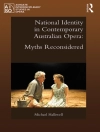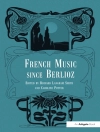This collection provides an in-depth look at musical criticism between the mid-nineteenth and the mid-twentieth century.
British music between the mid-nineteenth and the mid-twentieth century reflected changes and developments in society, education, philosophy, aesthetics, politics and the upheaval of wars, often signifying a distinctively British
national history. All of these changes informed the published work of contemporary music critics. This collection provides an in-depth look at musical criticism during this period. It focusses on major figures such as Grove, Parry, Shaw, Dent, Newman, Heseltine, Vaughan Williams, Dyson, Lambert and Keller, yet does not neglect less influential but nevertheless significant critics. Sometimes a seminal work forms the subject of investigation; in otherchapters, a writer’s particular stance is highlighted. Further contributions closely analyse the now famous polemics by Shaw, Heseltine and Lambert. The book covers a range of themes from the historical, scientific and philosophical to matters of repertoire, taste, interdisciplinary influence, musical democratisation and analysis. It will be of interest to scholars and students of nineteenth- and early twentieth-century British music and music in Britain as well as to music enthusiasts attracted to standard works of popular music criticism.
JEREMY DIBBLE is Professor of Music at Durham University.
JULIAN HORTON is Professor of Music at Durham University.
Contributors: KAREN ARRANDALE, SEAMAS DE BARRA, PHILIP ROSS BULLOCK, JONATHAN CLINCH, SARAH COLLINS, JEREMY DIBBLE, JULIAN HORTON, PETER HORTON, CHRISTOPHER MARK, AIDAN J. THOMSON, PAUL WATT, HARRY WHITE, BENNETT ZON, PATRICKZUK
Jadual kandungan
Introduction: Trends in British Musical Thought, 1850-1950 – Jeremy Dibble and Julian Horton
Avoiding ‘Coarse Invective’ and ‘Unseemly Vehemence’: English Music Criticism, 1850-1870 – Peter Horton
Spencer, Sympathy and the Oxford School of Music Criticism – Bennett Zon
Free Thought and the Musician: Ernest Walker, the ‘English Hanslick’ – Jeremy Dibble
Ernest Newman and the Promise of Method in Biography, Criticism and History – Paul Watt
‘Making Symphony Articulate’: Bernard Shaw’s Sense of Music History – Harry White
Analysis and Value Judgment: Schumann, Bruckner and Tovey’s
Essays in Musical Analysis – Julian Horton
The Scholar as Critic: Edward J. Dent – Karen Arrandale
Russia and Eastern Europe – Philip Ross Bullock
Anti-Intellectualism and the Rhetoric of ‘National Character’ in Music: The Vulgarity of Over-Refinement – Sarah Collins
Chosen Causes: Writings on Music by Bernard van Dieren, Peter Warlock and Cecil Gray – Séamas de Barra
‘Es klang so alt und war doch so neu’: Vaughan Williams, Aesthetics and History – Aidan J. Thomson
Constant Lambert: A Critic for Today? A Commentary on
Music Ho! – Christopher Mark
The Challenge to Goodwill: Herbert Howells, Alban Berg and ‘The Modern Problem’ – Jonathan Clinch
Hans Keller: The Making of an ‘Anti-Critic’ –
Select Bibliography
Mengenai Pengarang
PHILIP ROSS BULLOCK is Professor of Russian and Music at the University of Oxford, and Fellow and Tutor in Russian at Wadham College, Oxford. Previously for Boydell, he has published a translation of the correspondencence between Rosa Newmarch and Jean Sibelius, and in 2016, his biography of Tchaikovsky was published in the Critical Lives series by Reaktion.












